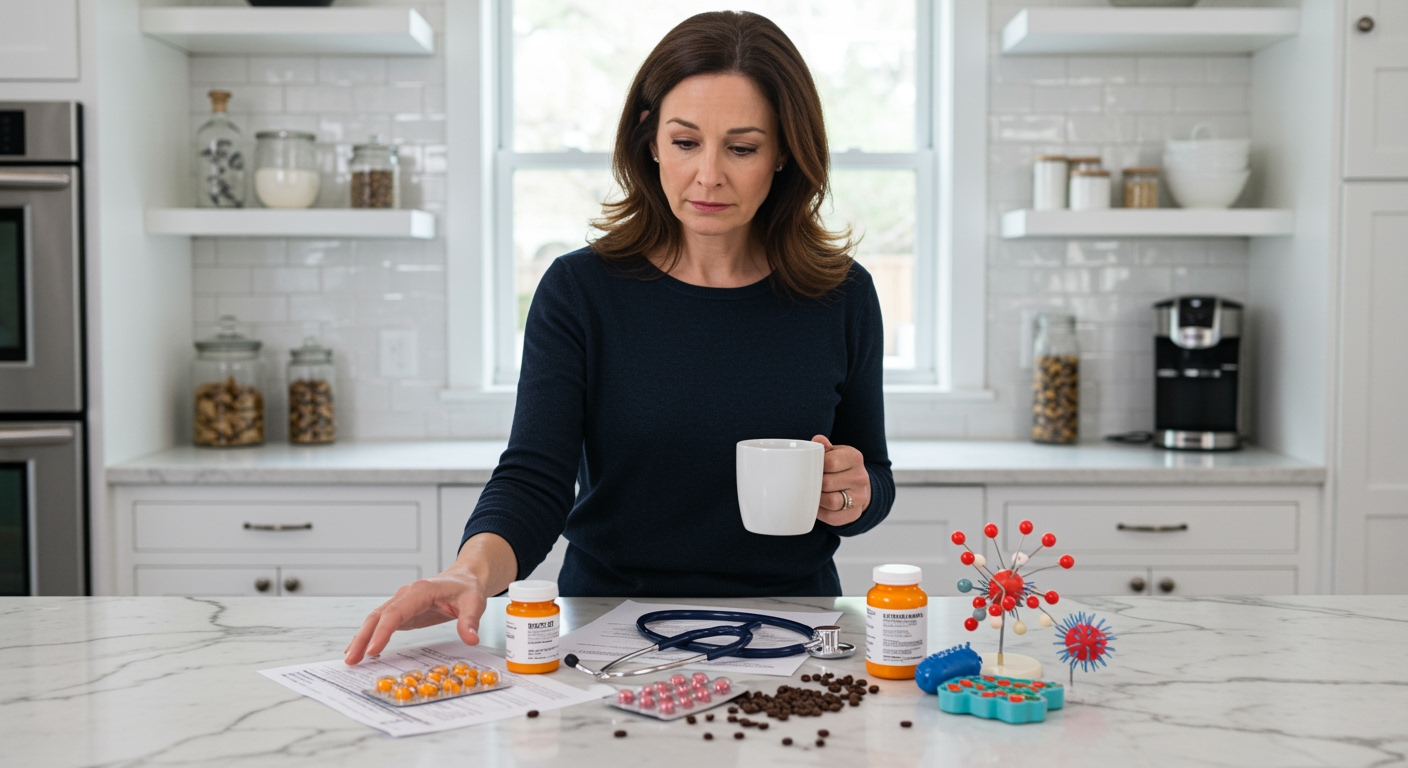✪ Key Highlight: Coffee consumption can reduce antibiotic effectiveness by interfering with bacterial transport systems.
Introduction
Your morning coffee ritual might be working against your antibiotic treatment in ways you never imagined.
New research published in PLOS Biology reveals that caffeine can significantly reduce the effectiveness of certain antibiotics against bacterial infections.
Hi, I’m Abdur, your nutrition coach and today I’m going to analyze this groundbreaking study that shows how your daily coffee habit could be sabotaging your recovery from bacterial infections.
How Does Coffee Interfere With Antibiotics?
Scientists from the University of Tübingen and University of Würzburg tested 94 different substances to understand how they affect bacterial behavior.
They focused specifically on Escherichia coli, a common bacteria that causes urinary tract infections, food poisoning, and other serious health problems.
The research team discovered that caffeine triggers a cascade of events starting with a gene regulator called Rob.
This gene regulator controls transport proteins that determine what gets into and out of bacterial cells.
When caffeine activates Rob, it changes how these transport proteins work inside the bacteria.
The result is that bacteria absorb lower levels of antibiotics like ciprofloxacin, making them less sensitive to treatment.
Professor Ana Rita Brochado, who led the study, explained that this creates an antagonistic interaction where caffeine and antibiotics work against each other.
✪ Fact: About one-third of tested substances interfered with bacterial transport systems, but caffeine showed the most significant impact.
Which Antibiotics Are Most Affected?
The study specifically found that caffeine reduces the effectiveness of ciprofloxacin, a commonly prescribed antibiotic.
Ciprofloxacin belongs to a class of antibiotics called fluoroquinolones, which work by interfering with DNA-related enzymes in bacteria.
Previous research has shown that caffeine can both inhibit and enhance different antibiotics depending on the specific drug and bacteria involved.
The interference happens because caffeine can bind to certain enzymes that fluoroquinolone antibiotics need to target for maximum effectiveness.
Interestingly, the researchers found that this weakening effect was not seen in Salmonella enterica, a bacteria closely related to E. coli.
This suggests that even similar bacteria can react differently to the same environmental triggers.
The differences likely occur because of variations in transport pathways or how different bacteria absorb antibiotics.
✪ Pro Tip: Always ask your doctor about potential food and drink interactions when prescribed any antibiotic.
What Is Low-Level Antibiotic Resistance?
This research highlights a concept called low-level antibiotic resistance, which differs from classic antibiotic resistance.
Classic antibiotic resistance occurs when bacteria develop genes that directly block drugs from working.
Low-level resistance, however, is caused by changes in gene regulation and environmental adaptation rather than genetic mutations.
Microbiologist Christoph Binsfeld explained that everyday substances like caffeinated drinks can impact gene regulators that control transport proteins.
These changes influence what enters and leaves bacterial cells, potentially making antibiotics less effective without creating permanent resistance.
This type of resistance is particularly concerning because it can happen with substances we consume daily.
Professor Karla Pollmann noted that these findings could have implications for how treatments are planned, including what foods or drinks should be avoided during therapy.
✪ Note: Low-level resistance is reversible and disappears when the interfering substance is removed from the environment.
Are There Other Medication Interactions With Coffee?
Coffee interactions extend beyond antibiotics to affect many other types of medications.
Caffeine is a stimulant, and when combined with other stimulants found in cold medicines, antidepressants, or asthma drugs, it increases side effect risks.
Common side effects from these interactions include jitters, headaches, rapid heartbeat, and increased anxiety.
Lab studies suggest caffeine can bind to some drugs in the stomach, reducing their absorption and potentially making them less effective.
This binding effect is particularly problematic with medications that need to be absorbed quickly for maximum benefit.
Pharmacists have long warned patients about timing coffee consumption around certain medications to avoid interference.
The research team emphasizes that more work is needed to understand exactly how different foods and drinks interact with various drugs.
✪ Pro Tip: Space your coffee consumption at least 2 hours before or after taking any medication unless your doctor advises otherwise.
The Bottom Line
This groundbreaking research proves that your daily coffee habit can significantly reduce antibiotic effectiveness against bacterial infections.
Your health is too important to let a cup of coffee compromise your recovery from serious infections.
I would love to hear your thoughts on this research and whether you have experienced any medication interactions with coffee or other beverages in the comment section below.
References
At NutritionCrown, we use quality and credible sources to ensure our content is accurate and trustworthy. Below are the sources referenced in creating this article:
- ScienceAlert: Mixing Coffee and Antibiotics Could Be a Bad Idea, Study Shows
- PMC: Caffeine and Antibiotic Interactions Research
- Sci News: Caffeine Effectiveness Antibiotics Study
- University of Tübingen: Study Finds Caffeine Can Weaken Effectiveness of Certain Antibiotics
- ScienceAlert: Coffee Can Mess With Your Medication





